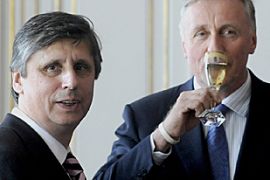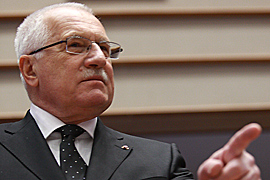Economist appointed as Czech PM
Statistics office chief to lead country through rest of troubled EU presidency.

Fischer has said he has no further political ambitions and will return to his job at the statistics office once his remit ends after elections in October.
‘Hard work’
The new prime minister said his main task was to put together a functioning team.
“It will not be a cabinet of visions, it will be a cabinet of hard work,” he said.
“This cabinet will have to fulfil with honour all tasks stemming from the (EU) presidency. It will also have to minimise the impact of the economic crisis on the Czech population.”
After appointing Fischer at a ceremony in Prague, the capital, Vaclav Klaus, the country’s president, said: “I am aware the situation is not easy, but I am convinced you will handle your role well and I’m ready to help you in this.”
The decision to appoint Fischer follows weeks of talks between the three centre-right governing coalition parties and the senior opposition Social Democrats, whose no-confidence vote toppled Topolanek’s cabinet on March 24.
Cross-party support
Both Topolanek’s Civic Democrats and the opposition Social Democrats, who together control three quarters of seats in the lower house of parliament, have agreed they will back Fischer’s cabinet.
 |
| The Czech president fervently opposes the EU’s Lisbon Treaty [EPA] |
Under the deal, none of the current cabinet ministers will keep their seats.
Despite their political divisions, the parties reached an agreement quickly, amid concerns that Klaus, a vocal Eurosceptic, might propose a cabinet of his own.
This would have given the president increased power to block the EU’s Lisbon Treaty, which he is known to oppose.
In February, the lower house of the Czech parliament approved the treaty, which the EU says is designed to streamline its decision-making processes, with cross-party support.
The text is now goes to the upper house, where a vote is scheduled for May 6 or 7.
If approved, it would need to be signed by Klaus for the ratification to be completed.